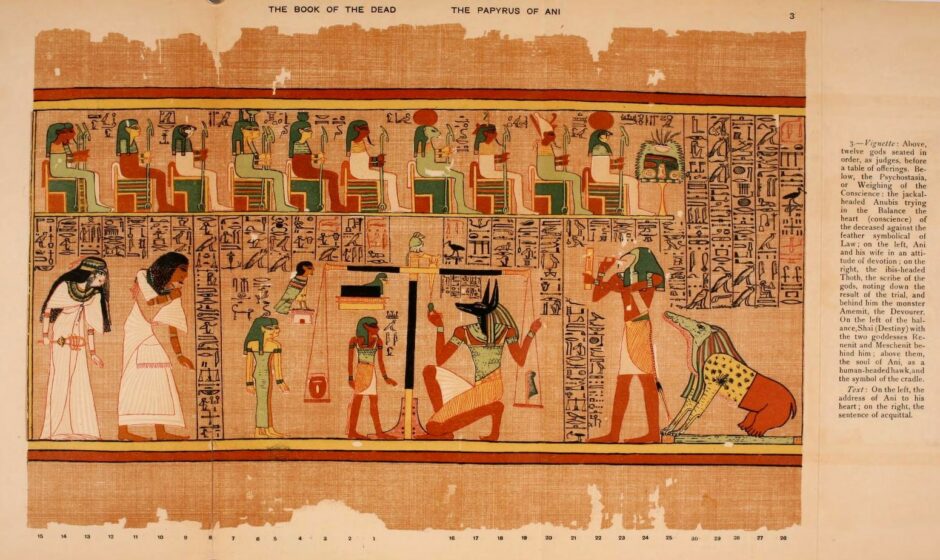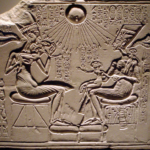1. Hail, Usekh-nemmt, who comest forth from Anu, I have not committed sin.
2. Hail, Hept-khet, who comest forth from Kher-aha, I have not committed robbery with violence.
3. Hail, Fenti, who comest forth from Khemenu, I have not stolen.
4. Hail, Am-khaibit, who comest forth from Qernet, I have not slain men and women.
5. Hail, Neha-her, who comest forth from Rasta, I have not stolen grain.
6. Hail, Ruruti, who comest forth from Heaven, I have not purloined offerings.
7. Hail, Arfi-em-khet, who comest forth from Suat, I have not stolen the property of God.
8. Hail, Neba, who comest and goest, I have not uttered lies.
9. Hail, Set-qesu, who comest forth from Hensu, I have not carried away food.
10. Hail, Utu-nesert, who comest forth from Het-ka-Ptah, I have not uttered curses.
11. Hail, Qerrti, who comest forth from Amentet, I have not committed adultery.
12. Hail, Hraf-haf, who comest forth from thy cavern, I have made none to weep.
13. Hail, Basti, who comest forth from Bast, I have not eaten the heart.
14. Hail, Ta-retiu, who comest forth from the night, I have not attacked any man.
15. Hail, Unem-snef, who comest forth from the execution chamber, I am not a man of deceit.
16. Hail, Unem-besek, who comest forth from Mabit, I have not stolen cultivated land.
17. Hail, Neb-Maat, who comest forth from Maati, I have not been an eavesdropper.
18. Hail, Tenemiu, who comest forth from Bast, I have not slandered anyone.
19. Hail, Sertiu, who comest forth from Anu, I have not been angry without just cause.
20. Hail, Tutu, who comest forth from Ati, I have not debauched the wife of any man.
21. Hail, Uamenti, who comest forth from the Khebt chamber, I have not debauched the wives of other men.
22. Hail, Maa-antuf, who comest forth from Per-Menu, I have not polluted myself.
23. Hail, Her-uru, who comest forth from Nehatu, I have terrorized none.
24. Hail, Khemiu, who comest forth from Kaui, I have not transgressed the law.
25. Hail, Shet-kheru, who comest forth from Urit, I have not been angry.
26. Hail, Nekhenu, who comest forth from Heqat, I have not shut my ears to the words of truth.
27. Hail, Kenemti, who comest forth from Kenmet, I have not blasphemed.
28. Hail, An-hetep-f, who comest forth from Sau, I am not a man of violence.
29. Hail, Sera-kheru, who comest forth from Unaset, I have not been a stirrer up of strife.
30. Hail, Neb-heru, who comest forth from Netchfet, I have not acted with undue haste.
31. Hail, Sekhriu, who comest forth from Uten, I have not pried into other’s matters.
32. Hail, Neb-abui, who comest forth from Sauti, I have not multiplied my words in speaking.
33. Hail, Nefer-Tem, who comest forth from Het-ka-Ptah, I have wronged none, I have done no evil.
34. Hail, Tem-Sepu, who comest forth from Tetu, I have not worked witchcraft against the king.
35. Hail, Ari-em-ab-f, who comest forth from Tebu, I have never stopped the flow of water of a neighbor.
36. Hail, Ahi, who comest forth from Nu, I have never raised my voice.
37. Hail, Uatch-rekhit, who comest forth from Sau, I have not cursed God.
38. Hail, Neheb-ka, who comest forth from thy cavern, I have not acted with arrogance.
39. Hail, Neheb-nefert, who comest forth from thy cavern, I have not stolen the bread of the gods.
40. Hail, Tcheser-tep, who comest forth from the shrine, I have not carried away the khenfu cakes from the spirits of the dead.
41. Hail, An-af, who comest forth from Maati, I have not snatched away the bread of the child, nor treated with contempt the god of my city.
42. Hail, Hetch-abhu, who comest forth from Ta-she, I have not slain the cattle belonging to the god.
The Negative Confession (also known as The Declaration of Innocence) is a list of 42 sins which the soul of the deceased can honestly say it has never committed when it stands in judgment in the afterlife. The soul would recite these in the presence of the gods who weighed their truth in deciding one’s fate.
The most famous list comes from The Papyrus of Ani, a text of The Egyptian Book of the Dead, prepared for the priest Ani of Thebes (c. 1250 BCE) and included among the grave goods of his tomb. It includes a number of chapters from the Book of the Dead but not all of them. These omissions are not a mistake, nor have sections of the manuscript been lost, but are the result of a common practice of creating a funerary text specifically for a certain person’s use in the afterlife. The Negative Confession included in this text follows this same paradigm as it would have been written for Ani, not for anyone else.
— Joshua J. Mark




Add your first comment to this post